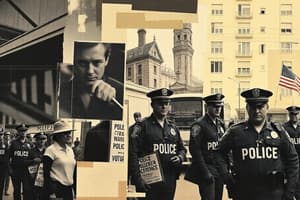Podcast
Questions and Answers
What aspects may officers in the future be evaluated on?
What aspects may officers in the future be evaluated on?
- Number of arrests made and self-initiated citizen contacts recorded
- Physical fitness and marksmanship skills
- Judgment and reasoning ability, problem-solving skills, human relations skills, sensitivity and responsiveness to community concerns (correct)
- Knowledge of criminal law and forensic techniques
What is a major shift involved in community policing?
What is a major shift involved in community policing?
- A shift from reactive to proactive policing (correct)
- A shift from working alone to always in pairs
- A shift from patrolling to desk work
- A shift in police uniforms
What is a possible negative effect of community-oriented policing mentioned in the text?
What is a possible negative effect of community-oriented policing mentioned in the text?
- Improved trust between police and citizens
- Increased community engagement
- Decrease in crime rates
- Potential division of the community based on willingness to work with the police (correct)
Why is it important to involve local community representatives in the planning stages of implementing community policing?
Why is it important to involve local community representatives in the planning stages of implementing community policing?
What does adopting community policing represent according to the text?
What does adopting community policing represent according to the text?
What is a key difference between traditional policing and community-oriented policing?
What is a key difference between traditional policing and community-oriented policing?
How might the evaluation criteria for police departments differ between community-oriented policing and traditional policing?
How might the evaluation criteria for police departments differ between community-oriented policing and traditional policing?
In what way might traditional police officers struggle with the concept of community-oriented policing?
In what way might traditional police officers struggle with the concept of community-oriented policing?
How does community-oriented policing differ from traditional styles regarding the authority given to individual police officers?
How does community-oriented policing differ from traditional styles regarding the authority given to individual police officers?
What aspect of police department evaluation might need to change when transitioning to community-oriented policing?
What aspect of police department evaluation might need to change when transitioning to community-oriented policing?
Why is it important to examine the quality of work rather than focusing solely on the number of arrests made or self-initiated citizen contacts?
Why is it important to examine the quality of work rather than focusing solely on the number of arrests made or self-initiated citizen contacts?
What difficulty is highlighted when considering adopting a community policing strategy?
What difficulty is highlighted when considering adopting a community policing strategy?
What is one major aspect that will be affected by the shift to community policing?
What is one major aspect that will be affected by the shift to community policing?
What is a potential consequence of not involving local community representatives in the planning stages of implementing community policing?
What is a potential consequence of not involving local community representatives in the planning stages of implementing community policing?
Why might community policing lead to difficulties for the police in terms of community relationships?
Why might community policing lead to difficulties for the police in terms of community relationships?




